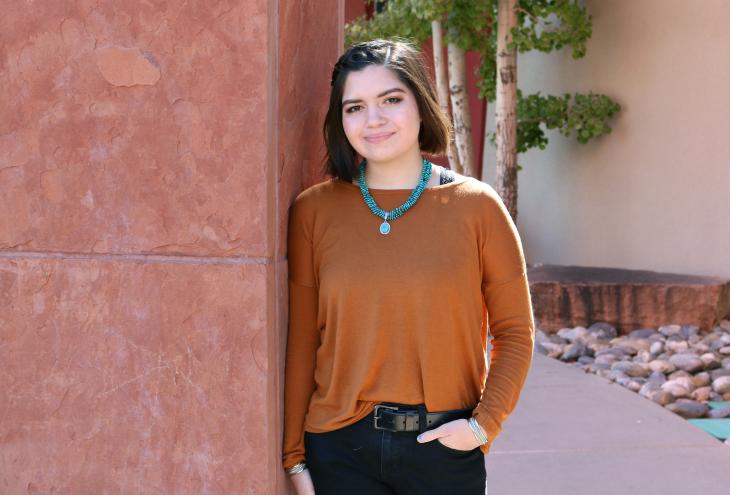My hometown of Farmington, N.M., is a small community with diverse cultures and families. We also have the best sunsets that range from cool purples and pinks to vibrant reds and oranges. The leaders in our community provide many programs to enrich Navajo youth, which I personally find valuable.
I’ve been a 4-H member, which has helped me develop my leadership skills and set project and personal goals. I’m also a Girl Scout. That’s where I started learning about STEM, through the Scouts’ STEM Day.
The spark for my interest in biology and the health sciences began when I was in middle school. My teacher, Ms. Jones, introduced me to Science Olympiad, which is held in all 50 states and features thousands of teams competing in the STEM fields. Science Olympiad also includes tournaments on college campuses and professional development workshops. I find the human body and genetics fascinating, and I usually compete in the Anatomy and Physiology event.
When I started at Navajo Preparatory School three years ago, my chemistry teacher, Ms. Flores, recognized my interest in science. She introduced me to AISES in my freshman year and encouraged me to participate in the AISES National American Indian Virtual Science and Engineering Fair (NAIVSEF), where I had to submit a presentation and video of my project, followed by a phone interview.
Now, as a junior, I’ll build on my biomedical NAIVSEF project to compete in Science Olympiad at the regional level in January 2019. This will be my sixth academic year to compete at the state and regional levels.
My topic was “Biomarkers for Diabetes on the Navajo Nation.” I was inspired to do this project while I was in Project SMART (Science and Mathematics Achievement Through Research Training), a four-week program designed to educate and motivate students in science and mathematics.
I wanted to come up with a project that would ultimately benefit the Navajo Nation. I knew that Navajos, and Natives in general, have a higher incidence of diabetes. I wanted to compare the biomarker measurements of Navajo men and women who have diabetes with those who don’t, and I was one of two Grand Award recipients. This year I’m going to continue phase two of this project to further research ways to measure biomarkers for diabetes.
Because I was a Grand Award winner, AISES sponsored my participation in the Intel International Science and Engineering Fair, the largest pre-college scientific research event in the world, held this past May in Pittsburgh. I presented my diabetes study, and although I didn’t place, it was a great experience to see students from more than 82 countries competing.
I’m so thankful for the support of my family, especially my parents, who’ve always encouraged me to pursue my passions and who’ve stressed the importance of being a lifelong learner — they are the best role models I could ask for. Additionally, my grandparents are the backbone of my family. It’s with them that I’m able to keep ties to my Navajo culture and heritage. My family’s support and the activities I’ve been involved with have given me the confidence to step out of my comfort zone. Although it can be uncomfortable at first, when I do try something new, it’s always worth it.
I plan to go to college and am beginning my search for different universities. I’m looking into the health sciences as a major, but I haven’t decided yet. Whatever career I choose, I know it will be my passion and I will put all my effort into pursuing my goals.













